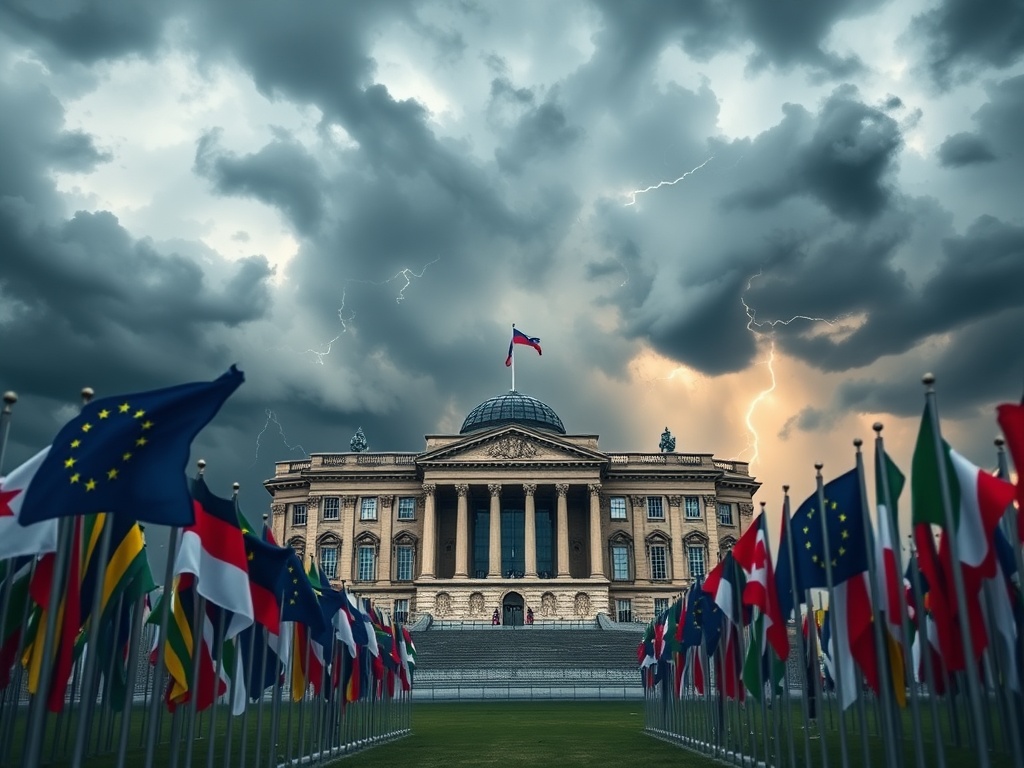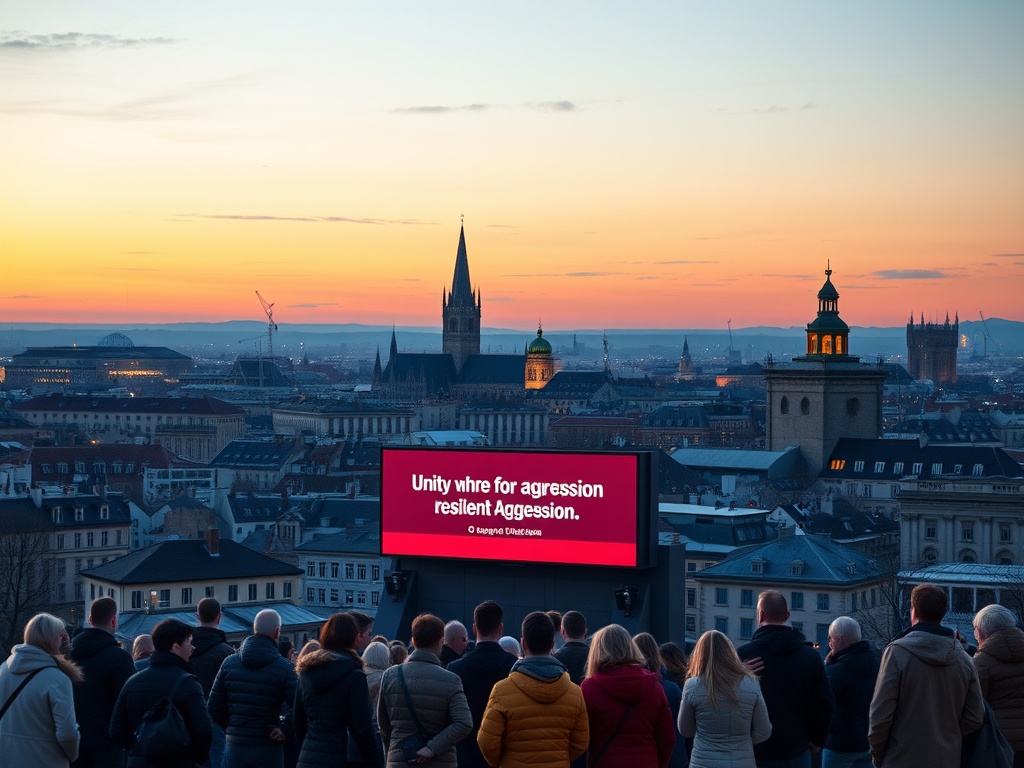Europe Faces a Critical Choice: Stand Firm Against Putin’s Aggression

Europe is on the brink of a potential conflict reminiscent of the Second World War if its leaders choose to “appease” Vladimir Putin regarding Ukraine, warns Tobias Ellwood, a prominent Conservative figure and former chair of the Commons Defence Select Committee. Ellwood emphasizes that European nations should consider supporting Ukraine in its fight against Russia independently, rather than accepting a peace deal brokered by Donald Trump that would allow Putin to emerge with a semblance of victory.
“This cannot be 1938 again,” Ellwood cautioned. “This is Europe’s moment to step up, unite, and continue to support Ukraine in its ongoing battle.” His remarks come in the wake of growing concern across Europe regarding the shifting dynamics of US foreign policy under Trump.
Recently, the United States demonstrated its alignment with Russia during United Nations votes commemorating the third anniversary of Putin’s invasion of Ukraine. Trump has even gone so far as to label Ukrainian President Volodymyr Zelensky a “dictator”, while refraining from using the same term for Putin. Furthermore, the US is attempting to negotiate a minerals deal from Ukraine in exchange for the military assistance it has provided to Kyiv.
In a recent piece for The i Paper from Kyiv, Ellwood, who previously lost his parliamentary seat, stated, “Europe is witnessing a departure from the decades-old relationship with America. Trump is actively working to rehabilitate Putin’s image on the global stage while diminishing America’s role in Ukraine’s long-term security unless it is tied to a minerals deal.”
Ellwood’s comments came just before Sir Keir Starmer announced a significant increase in defense spending as a response to the threats posed by “tyrant” Putin and the uncertainty surrounding Trump’s commitment to European security. The Prime Minister outlined plans to raise defense spending from the current 2.3 percent of the economy to 2.5 percent by 2027, with aspirations of reaching 3 percent during the next parliamentary term. However, this increase will necessitate cuts to development assistance, reducing it from 0.5 percent to 0.3 percent of gross national income by 2027.
Starmer characterized this plan as “the largest sustained increase in defense spending since the end of the Cold War.” Prior to Starmer’s announcement, Ellwood highlighted that Europe faces a stark choice: an American-led deal that could potentially favor Putin, or a European-led initiative that may or may not include US support. He articulated, “Any agreement that allows Putin to claim even a partial victory, regardless of the security guarantees, would be perceived as appeasement and could provide Russia the opportunity to rebuild its military and launch future aggressions.”
In contrast, Ellwood advocates for Europe to take the lead in negotiating a deal that aligns with Ukraine’s interests or, if negotiations falter, to persist in supporting Ukraine’s military efforts. He stressed that the outcome of this war will significantly impact any future peace. “An empowered Putin signifies ongoing instability in Europe, while a fortified Ukraine contributes to greater European security,” he explained.
Ellwood asserted that “militarily, with increased defense budgets, Europe possesses the collective force necessary to enable Ukraine to conclude the war independently of American support.” He concluded, “On this somber anniversary, the dominant message from Kyiv is, ‘Three Years – Time to Win.’ Ukraine has defied expectations by resisting a state invasion. It is not prepared to surrender, and neither should we.”
A Call to Defend European Democracy
In a recent interview on Fox News, when US Defence Secretary was asked whether he agreed that Russia’s actions against Ukraine were unprovoked, Pete Hegseth hesitated before responding, “It’s complicated.” This moment encapsulates the alarming trend of dangerous narratives being promoted by Trump’s inner circle regarding the Ukraine conflict. It serves as a crucial wake-up call for Europe as it faces a new reality.
Ellwood’s commentary reflects the ongoing transformation of the transatlantic alliance, which is now navigating a period of diminished American security commitments in Europe as it reallocates focus to other global interests. The US government suggests that Europe’s greatest threats are internal rather than external, even going as far as to support the far-right AfD party in Germany and questioning the legitimacy of Ukrainian leadership.
Some may argue that Trump’s tactics are merely a strategic bluff intended to disrupt stagnant thinking and foster new solutions. However, the stakes are too high for Europe to gamble on such uncertainty; it must prepare for a significant shift. Two outcomes are now possible: one led by America, which is likely to benefit Putin, or another spearheaded by Europe, with uncertain American involvement.
In the first scenario, any agreement allowing Putin to claim a partial victory, despite robust security assurances, would be seen as appeasement and would enable Russia to rearm and pose further threats in the future. Putin’s ultimate goal remains the complete subjugation of Ukraine, which he views as integral to Russia’s historical identity and a buffer against an expanding EU and NATO.
In the alternative scenario, Europe must take the initiative to negotiate a deal that meets Ukraine’s needs or, should negotiations fail, continue to back Ukraine’s military efforts, understanding that the outcome of this war will shape future peace. An empowered Putin signifies continued discord in Europe, while a resilient Ukraine fosters stability.
If Europe chooses this path, it must confront a challenging question: why, after three years of conflict, has Western support primarily focused on preventing Ukraine’s defeat rather than ensuring its victory? Too often, the threat of Putin’s nuclear posturing has led to hesitancy regarding the type and volume of military assistance provided to Ukraine.
With increased defense spending, Europe possesses the military capability to assist Ukraine in concluding the war even in the absence of American backing. However, the critical question remains: do we possess the essential political will to do so? For those who may doubt, consider the implications for European security and, by extension, our economies, if we allow Putin to continue his expansionist agenda unchecked.
Britain is already experiencing the effects of daily grey zone warfare aimed at inflicting economic damage and creating political division. Moreover, what message would we send to other authoritarian leaders across the globe if we falter now? As we observe this somber anniversary, the resounding message from Kyiv is clear: “Three Years – Time to Win.” Ukraine has shown remarkable resilience in the face of invasion. It refuses to yield, and neither should we. We cannot afford to let history repeat itself; this is not 1938. We must reject appeasement and stand firm against tyranny. This is Europe’s moment to unite and continue the fight for Ukraine. Let us not grant Putin a “victory” that could enable him to rearm, regroup, and launch further assaults. This is a battle for European democracy, and we must not surrender.
Tobias Ellwood is a Conservative former defence minister.




